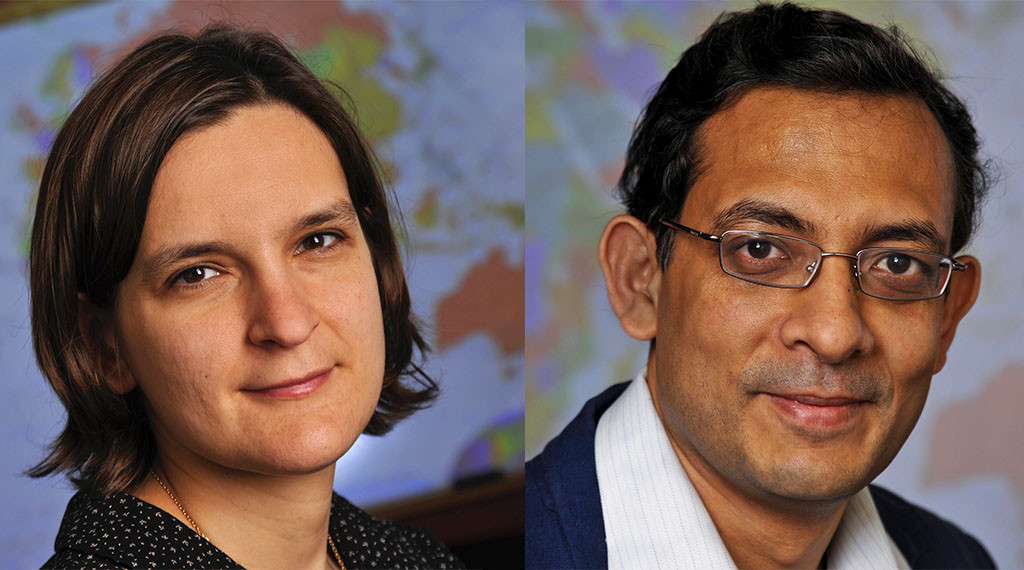
Nobel Prize in Economics for Abhijit Banerjee and Esther Duflo, founders and directors of the Poverty Action Lab at MIT, winner in 2008 of the Frontiers Cooperation Award
The 2019 Nobel Prize in Economics has recognized “the experimental approach to alleviating global poverty” of Abhijit Banerjee and Esther Duflo, founders and directors of the Abdul Latif Jameel Poverty Action Lab (J-PAL) at Massachusetts Institute of Technology, which won in the Development Cooperation category in the first edition of the BBVA Foundation Frontiers of Knowledge Awards. This laboratory, formed by MIT economists, promotes the use of scientific techniques to assess the effectiveness of development assistance funding. Duflo and Banerjee share the award with Harvard economist Michael Kremer, who is also an affiliate professor at J-PAL. The work of the three laureates, says the Nobel citation, “has considerably improved our ability to fight global poverty,” adding that “in just two decades, their new experiment-based approach has transformed development economics, which is now a flourishing field of research.” Kremer participated in the workshop on Scientific Analysis of Development Programs and Foreign Aid held in the BBVA Foundation in January 2007, and contributed to the resulting publication El análisis experimental de la ayuda al desarrollo; la evaluación de lo que funciona y lo que no funciona.
14 October, 2019
In bestowing the award on J-PAL, the Frontiers committee remarked that the method developed by its economist members had proved “a valuable tool for answering specific questions which has in some cases led to important policy actions.”
Between 1960 and 2008, the year J-PAL received the Frontiers Award, a total of USD 2.7 trillion was spent worldwide on development cooperation. But for most of this time, no techniques were available to reliably measure how effective such aid had been. J-PAL analyzes development assistance programs to determine whether the funds invested are being properly utilized and are delivering the desired results, something similar to the way an audit works in the corporate environment. Experts in development economics believe the scientific tools this laboratory deploys represent a before and after in aid program evaluation.
J-PAL, established in 2003 by three MIT economists, has successfully built up a worldwide network of experts. The lab promotes the use of randomized evaluation in development assistance, along the lines of the methods used to test new drugs and vaccines. J-PAL has applied them, for instance, to, gauge the efficiency of campaigns behind the use of anti-malarial bednets or strategies to combat teacher absenteeism. Its advocacy of this approach has led to it being taken up by numerous international organizations.
In the words of the Frontiers committee, J-PAL has successfully promoted “the scientific evaluation of development interventions in areas including education, health and financial markets.” Its methods “have been shown to be a valuable tool for answering specific policy questions,” and its work “has led to the expanded use of this approach by development practitioners and researchers.”
Ten Frontiers laureates awarded the Nobel Prize
The Nobel Prize in Economics awarded today to Abhijit Banerjee and Esther Duflo, the founders of J-PAL, and the Nobel in Physics won last week by Michel Mayor and Didier Queloz, makes a total of ten previous laureates of the Frontiers of Knowledge Awards who have gone on to win the recognition of the Swedish Academy. Shinya Yamanaka and James P. Allison, winners in the Biomedicine category of the awards, received the Nobel Prize in Medicine in 2012 and 2018 respectively, while Robert J. Lefkowitz, Frontiers laureate in Biomedicine, obtained the Chemistry Nobel in 2012. In Economics, Finance and Management, three Frontiers awardees have gone on to take the Nobel Memorial Prize in Economic Sciences: Lars Peter Hansen, Nobel laureate in 2013; Jean Tirole, in 2014, and Angus Deaton, in 2015. Finally, William Nordhaus followed up his Frontiers Award in Climate Change with the Nobel in Economics, both in 2018.

